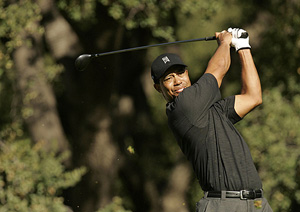Featured Golf News
Is Tiger Woods Bad for the PGA Tour?

The above question sounds heretical, but a recent article made a compelling argument that when Tiger Woods doesn't play in a PGA Tour event, it can suffer fatal consequences from the ensuing dearth of corporate-sponsorship, falling attendance and poor television ratings.
Ray McNulty, a sports columnist for Scripps Treasure Coast (Fla.) Newspapers, The Stuart News, Fort Pierce Tribune and Vero Beach Press Journal, interviewed Jack Vickers, founder of The International in Castle Pines, Colo. Woods hasn't played in The International since 1999. According to Vickers, a well-respected figure in golf, the 21-year-old event has been dropped by the PGA Tour because a corporate sponsor has not been willing to put up the cash for a Tiger-less tournament.
"There's no question that he has a profound effect," Vickers told McNulty and other reporters last Thursday, when PGA Tour Commissioner Tim Finchem announced the event's demise. "If he was here, I don't think it would be any different than any place else he goes: The crowds gather and they want to see him. He's the guy."
It's not earthshaking news that Woods is the game's predominant figure. Indeed, no individual has such a grip on his sport as Tiger. McNulty surmises that Woods is bigger than the PGA Tour. Who's to argue? If Tiger isn't in your tournament - with the exceptions being The Masters, U.S. Open, British Open and a few other "traditional" events, the chances of success are greatly impaired.
The only event Woods played on the West Coast Swing, the Buick Open at Torrey Pines (owing mainly to his role as spokesman for the sponsor), he won, keeping alive his attention-gathering streak of seven straight wins in PGA Tour events. (To his credit, Woods said the streak isn't the same as Byron Nelson's Tour-record 11 straight. "It encompasses two different years, just like '99 and 2000 [when Woods won four major titles in a row but not the Grand Slam]. I play all around the world. I lost to Shaun Micheel [in the World Match Play Championship], I lost the Ryder Cup, I lost in China and I lost in Japan. There are some L's in there, and they are not all W's.")
At all the other tournaments completed this year so far - the Mercedes Benz Championship, the Sony Open, Bob Hope Chrysler Classic, the FBR Open in Scottsdale, and the recently completed AT&T Pebble Beach Pro-Am (won by his erstwhile nemesis, Phil Mickelson), Tiger was a no-show. In between, he accepted millions of dollars in appearance fees to fly by private jet to the Middle East to play in the Dubai Desert Classic.
The players who came to Colorado are saddened by the loss of Vickers' tournament, where they enjoyed the Stableford scoring format, the scenic golf course, the hospitality, and the milkshakes in the locker room. But the continued absence of Woods, who played there only twice, spelled its doom.
"All of a sudden, we're into an era where the marketplace out there is not the same, and I think it's been influenced by some phenomena in that we have one outstanding, unbelievable player in the form of Tiger Woods," Vickers said. "When he's playing, the ratings are great. And when he isn't playing, the ratings aren't so hot."
It's impossible for the Tour or anyone else to expect Woods to play in every tournament on the schedule. But the Tour's overall TV ratings have slipped in recent years, owing mainly to tournaments in which Woods doesn't play or isn't on the leaderboard. Perhaps this is symptomatic of American's infatuation with instant gratification and our ever-flickering attention span: If golf's best player isn't at a tournament or is not in contention, we can't be bothered.
McNulty makes the point that the PGA Tour is hoping someone, anyone, comes along to challenge Woods' unquestioned supremacy. Mickelson was supposed to be the man, and he enjoyed some shining moments with victories in the 2005 PGA Championship and last year's Masters. But his un-Tiger-like meltdown in the U.S. Open at Winged Foot last summer led onlookers to question his greatness. As for the other members of the so-called "Big Five" - Vijay Singh, Ernie Els and Retief Goosen, advancing age, spotty performances and inconsistent levels of heroism during the heat of battle have doomed their chances to rival the world's No. 1-ranked player.
"One of the things that's not there today - and I don't know whether it's the golfing ability or the charisma - but there are not the people pressing Tiger out there competitively that were there when (Jack) Nicklaus and (Arnold) Palmer" were playing, Vickers said of the Tour's surge in popularity during the 1960s and '70s.
"I think if we had two or three more Tigers . . . you would probably see a different condition out there. But it's a phenomenon. None of us can do anything about that. And, God bless him and to his credit, it is what it is."
The PGA Tour, meanwhile, is left in an unstable situation, simultaneously reliant on Woods to put professional golf on the first page of the nation's sports sections, yet frustrated that well-run and popular tournaments such The International are seriously eroded by his absence.
"Candidly, the reason we're sitting here in February," Finchem said last week, "is because we didn't want to believe this could happen."
It's a Darwinian formula, whereby only the events with Tiger's participation survive. The PGA Tour knows it, the major television networks and the Golf Channel know it, golf fans know it, and, presumably, so does Mr. Woods.
Story Options
 |
Print this Story |
